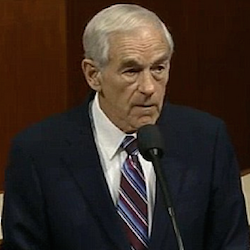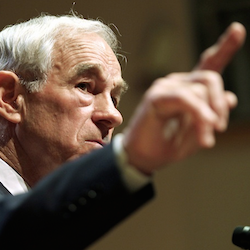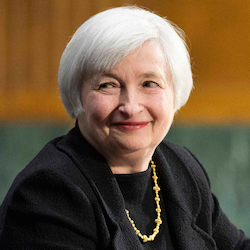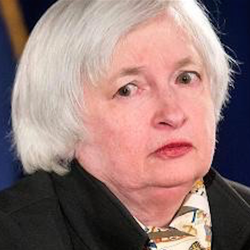
By Norm Singleton
This month marks the eight-year anniversary of the bursting of the housing bubble and the resulting stock market downturn. Following the crash, Congress passed the Emergency Economic Stabilization Act, which authorized the use of taxpayer funds to bailout powerful corporations. As President Bush so memorably put it: “I’ve abandoned free-market principles to save the free market system.” The atmosphere on Capitol Hill following the crash was almost as hysterical as what followed September 11th. In both cases, the panicked atmosphere resulted in the passage of hastily written legislation. Sadly, but not surprisingly, the failure of the so-called "Emergency Economic Stabilization Act" to stabilize the economy did not stop Congress and the Fed from their unprecedented program of bailouts, stimulus spending, and money creation. As those who understand economics predicted, this attempt to spend-and-inflate our way to prosperity has failed miserably, although it has benefited Wall Street, the Big Banks, and well-connected crony capitalists. This is why none other than Donald Trump once said that Quantitative Easing is a "great deal for guys like me." Of course the American people still do not know the full truth about what, if any, plans the Federal Reserve has to bailout Wall Street, the big banks, and foreign governments in the (inevitable) event of a major crash. This is why Campaign for Liberty is pushing for a Senate vote on Audit the Fed this year. Here is Ron Paul's official statement on the Emergency Economic Stabilization Act: Madam Speaker, I rise in strong opposition to this bill. This is only going to make the problem that much worse. The problem came about because we spent too much; we borrowed too much, and we printed too much money; we inflated too much, and we overregulated. This is all that this bill is about is more of the same. So you can't solve the problem. We are looking at a symptom. We are looking at the collapsing of a market that was unstable. It was unstable because of the way it came about. It came about because of a monopoly control of money and credit by the Federal Reserve System, and that is a natural consequence of what happens when a Federal Reserve System creates too much credit. 
By Ron Paul
Homeschooling is very important to me. That’s why I responded so favorably to both Tom Woods and Gary North on putting the Ron Paul Curriculum together. Of all the things that I do, even politically, I’ve always concentrated on education. Politics was an educational bully pulpit for me. On it’s own, politics is rather annoying. If the Ron Paul Curriculum does what I expect and anticipate, it could be one of the most important things that I have done. It doesn’t happen overnight, however. Work on the program has taken place over a couple of years now, and things are growing steadily. The curriculum has spread by word-of-mouth thus far. Parents don’t have to be wealthy, as people with modest incomes have been signing up. I sincerely believe that the Ron Paul Curriculum is an answer to counter all the misinformation that we get from government schools. I believe that we’re living in a time where we’re going through a transition. We’re seeing the failure of government education, foreign policy, and welfare. It’s all going down the tubes. That’s why I see a tremendous opportunity for homeschooling. Please visit the Ron Paul Curriculum to see if it can be of value to you or anyone in your family. Thank you, and be sure to tune in tomorrow to the Liberty Report! As Greece grapples with a continued downturn, bartering is gaining traction at the margins of the economy, part of a collection of worrisome signs for Prime Minister Alexis Tsipras who was re-elected on Sunday.
Let us not forget the images as well, of Greeks finding out that they have been swindled by their government and banks:
How can this be?
Millions of people believe that the money in their possession is (in fact) theirs, and yet one day they wake up to find that the monetary system is a giant government scam! The banks don't have their hard earned money! Imagine taking a family heirloom, like an antique clock, to a storage facility. In your mind, the clock is absolutely your property, and you pay the storage facility a fee for keeping it safe for you. Then one day, you go to pick-up your clock, and the storage facility tells you "Sorry, it's gone." The clock wasn't stolen by a bunch of street bandits. There was no Ocean's Eleven type break-in. No, the storage facility just decided to lend it out, and now it's not coming back! However you never gave permission for the storage facility to lend out your clock. In fact, your understanding was that you could come to pick up the clock any day that you pleased. It would always be there (in storage) waiting for you. Do you think the storage facility would get away with such fraud? Better yet, would it ever be "legal"? Sadly, government's monopolized money "system" works the same way....Yes even in America. In fact, especially in America. The moment that you put your money into the government's banking "system", you're surrendering it. Government blows a smoke screen in your face by saying that you're "insured" up to $250 thousand. But that's about as true as government signs outside of schools that say they are "Drug Free". In other words, it's not true at all! When the scam is ultimately exposed (and there has never been an exception in mankind's entire history) people are forced to return to barter....chickens for medical care....tomatoes for sticks of butter. Government shoves people back into primitive times. Such is happening in Greece right now. It's a shame, it doesn't have to happen. People don't have to trust government, and allow it to monopolize money. But government is very good at generating fear of any alternatives. How will you survive without government lording over you? Free market money (such as gold & silver) are the time-tested solution to this cycle of madness. They're always patiently waiting in the wings, just standing by to be re-discovered. Time is not against them. They have all the time in the world. They've been here since the beginning of time, and they're not going anywhere. Governments cannot create gold and silver. They cannot type into a keyboard and conjure them out of thin air, like they can do with dollars, or euros. If government wants another war, or to dole out more welfare, it types into a keyboard. Gold and silver would severely limit them. Governments hate gold and silver. They will do anything and everything to make sure that the people believe in their "system" instead. Those that do, continue to weep.  By Ron Paul Is the current refugee crisis gripping the European Union “all America’s fault”? That is how my critique of US foreign policy was characterized in a recent interview on the Fox Business Channel. I do not blame the host for making this claim, but I think it is important to clarify the point. It has become common to discount any criticism of US foreign policy as “blaming America first.” It is a convenient way of avoiding a real discussion. If aggressive US policy in the Middle East – for example in Iraq – results in the creation of terrorist organizations like al-Qaeda in Iraq, is pointing out the unintended consequences of bad policy blaming America? Is it “blaming America” to point out that blowback – like we saw on 9/11 – can be the result of unwise US foreign policy actions like stationing US troops in Saudi Arabia? In the Fox interview I pointed out that the current refugee crisis is largely caused by bad US foreign policy actions. The US government decides on regime change for a particular country – in this case, Syria – destabilizes the government, causes social chaos, and destroys the economy, and we are supposed to be surprised that so many people are desperate to leave? Is pointing this out blaming America, or is it blaming that part of the US government that makes such foolish policies? Accusing those who criticize US foreign policy of “blaming America” is pretty selective, however. Such accusations are never leveled at those who criticize a US pullback. For example, most neocons argue that the current crisis in Iraq is all Obama’s fault for pulling US troops out of the country. Are they “blaming America first” for the mess? No one ever says that. Just like they never explain why the troops were removed from Iraq: the US demanded complete immunity for troops and contractors and the Iraqi government refused. Iraq was not a stable country when the US withdrew its troops anyway. As soon as the US stopped paying the Sunnis not to attack the Iraqi government, they started attacking the Iraqi government. Why? Because the US attack on Iraq led to a government that was closely allied to Iran and the Sunnis could not live with that! It was not the US withdrawal from Iraq that created the current instability but the invasion. The same is true with US regime change policy toward Syria. How many Syrians were streaming out of Syria before US support for Islamist rebels there made the country unlivable? Is pointing out this consequence of bad US policy also blaming America first? Last year I was asked by another Fox program whether I was not “blaming America” when I criticized the increasingly confrontational US stand toward Russia. Here’s how I put it then: I don't blame America. I am America, you are America. I don't blame you. I blame bad policy. I blame the interventionists. I blame the neoconservatives who preach this stuff, who believe in it like a religion -- that they have to promote American goodness even if you have to bomb and kill people. In short, I don’t blame America; I blame neocons.
Great myths die hard, and one of the greatest of the last century is the myth that a group of central planners at The Federal Reserve can run an economy.
Hedge Fund manager and Senior Economic Advisor to Rand Paul's 2016 campaign, Mark Spitznagel, appeared on Fox Business to discuss the slow death of The Fed:  By Rand Paul and Mark Spitznagel The recent tumult in U.S. equity markets has prompted many analysts to urge the Fed to postpone any increase in interest rates. This advice assumes that rock-bottom interest rates are balm for a weak economy, with the only possible side effect being price inflation. Yet it is the Fed’s artificially low interest rates that set up the economy for the 2008 crisis, not to mention previous crises. The “doves” are right to point out that higher interest rates will lead to a repricing of many securities, aka a crash. But years of near-zero interest rates have made this inevitable. Continuing on the current course will only allow structural distortions caused by these interest rates to fester and an inevitable reckoning that will be much worse than seven years ago. The master fallacy underlying so much economic commentary is to imagine that a handful of experts in Washington should be setting the price of borrowing money. Instead, the Fed should set markets free. In their theory of business cycles, the Austrian economists Ludwig von Mises andFriedrich Hayek explained several decades ago that artificially cheap credit misleads entrepreneurs and investors into doing the wrong things—which in the current financial context includes making unsustainable, levered investments in risky assets, including companies loading up on debt to buy back and boost the price of their stock. Low interest rates may create an illusion of robust markets, but eventually rates spike, assets are suddenly revealed to be too highly priced, and debt unpayable. Many firms have to cut back production or shut down, unemployment rises and the boom goes bust. The Austrian diagnosis leads to an unorthodox prescription: Rather than provide “stimulus” to boost demand during a slump, the Federal Reserve and Congress should stand aside. Recessions are a painful but necessary corrective process as resources—including labor—are guided toward more sustainable niches, in light of the errors made during the giddy boom period. In 2000 the stock market, bloated by earlier Fed rate cuts, started falling when the tech bubble burst. Markets bottomed out in 2002, as the Fed slashed rates. Although people hailed then-chairman Alan Greenspan as “the Maestro” for providing a so-called soft landing, in hindsight he simply replaced the dot-com bubble with a housing bubble. When the housing bubble eventually burst, the crisis was much worse than in 2000. When Lehman Brothers failed in September 2008, it seemed as if the whole financial infrastructure was in jeopardy. And Fed Chairman Ben Bernanke followed the same playbook: cut interest rates. Read the rest at The Wall Street Journal [Subscription Required] Used with permission from The Wall Street Journal, WSJ.com. Copyright 2015 Dow Jones & Company, Inc. All rights reserved.
 By Ron Paul I’d like to talk about the silliness of The Federal Reserve. Here we have 12 people, secretly in a room, and they’re pretending to know what interest rates ought to be. The real problem is that they believe they’re smart enough to figure it out. My argument is that they don’t have the vaguest idea what interest rates should be. Nobody in the world knows what they should be! Just as all prices should be set in the marketplace, it takes hundreds, thousands, and millions of people to buy and sell, as well as borrow and lend, for interest rates to be determined. Central bankers merely deceive themselves. I have met Federal Reserve Board members who really believe in this. It’s almost like a religious belief that the world would be totally chaotic if you didn’t have smart people doing central economic planning by manipulating interest rates and the money supply. I’d like to share a quote from Friedrich Hayek, who is the one and only Austrian economist to win a Nobel Prize. Hayek won that prize in 1974. Interestingly enough, in the early 1980’s, he was in Washington D.C., while I was a member of Congress. I was fortunate enough to have dinner with Hayek, which was really a fascination for me. Hayek is well known for a statement and concept that he called “The Pretense of Knowledge”: "To act on the belief that we possess the knowledge and the power which enable us to shape the processes of society entirely to our liking, knowledge which in fact we do not possess, is likely to make us do much harm." There can’t be anything more straightforward than that. Hayek has been proven absolutely right. Look at the harm done by The Federal Reserve’s manipulations. Unfortunately, at the present time, we have socialism in money. However, the markets always win out in the end. We have a tremendous opportunity before us. As the failure of The Federal Reserve becomes more apparent, changes will have to come. Hopefully, enough people will be open to the ideas of sound money when that time does, in fact, arrive. Thank you, and be sure to tune in to tomorrow's Liberty Report! |
Archives
April 2024
|


 RSS Feed
RSS Feed



